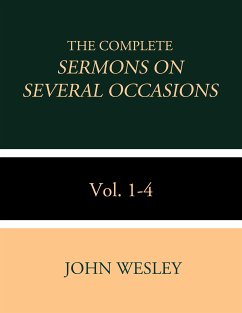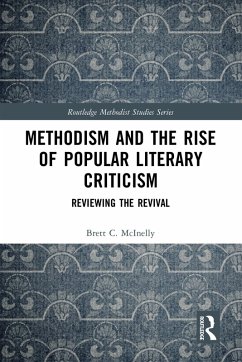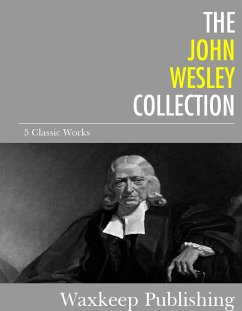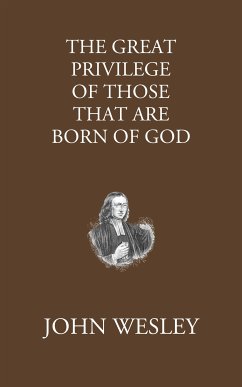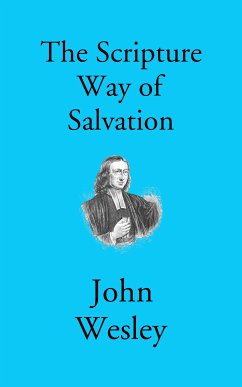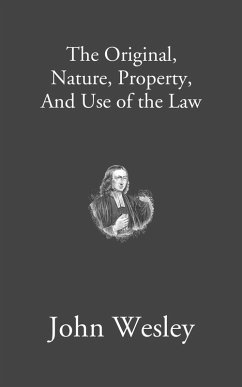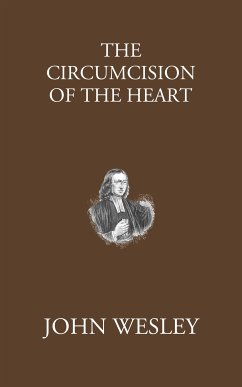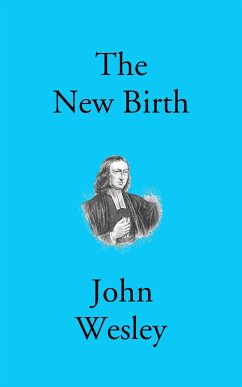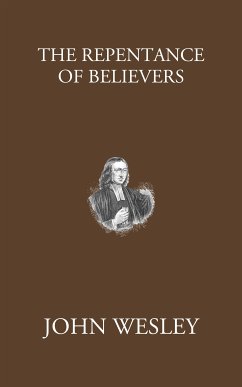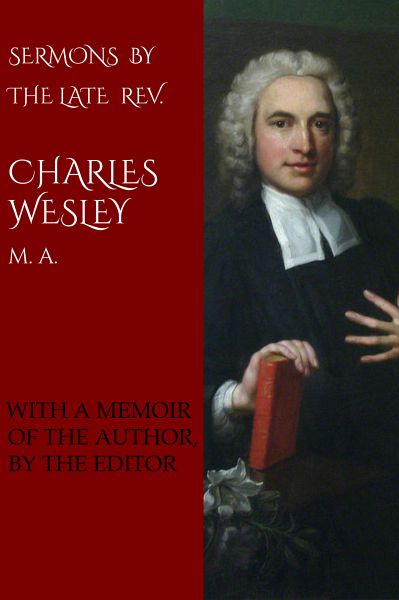
Sermons by the Late Rev. Charles Wesley (eBook, ePUB)

PAYBACK Punkte
0 °P sammeln!
THE Rev. Charles Wesley was descended from a long line of learned and pious ancestors, who had the honour of being sufferers, in the different ages wherein they lived, for their steady adherence to their religious principles.His great-grandfather, Bartholomew Wesley, John, son to him, and his maternal grandfather the celebrated Samuel Annesley,* LL. D. first cousin to Lord Annesley, Earl of Anglesea, were all ejected from their livings by the act of uniformity, and enrolled amongst those illustrious names who chose rather to sacrifice every worldly advantage than violate their conscience; affo...
THE Rev. Charles Wesley was descended from a long line of learned and pious ancestors, who had the honour of being sufferers, in the different ages wherein they lived, for their steady adherence to their religious principles.
His great-grandfather, Bartholomew Wesley, John, son to him, and his maternal grandfather the celebrated Samuel Annesley,* LL. D. first cousin to Lord Annesley, Earl of Anglesea, were all ejected from their livings by the act of uniformity, and enrolled amongst those illustrious names who chose rather to sacrifice every worldly advantage than violate their conscience; affording bright examples of heroic firmness and Christian resignation, under the oppressions of a violent party and malicious enemies.
His father, the Rev. Samuel Wesley, quitted the Dissenters when a boy, from reading a defence of the death of King Charles I. From a private academy he entered himself at Exeter College, Oxford, where by his erudition and abilities he soon acquired academic honours, and maintained himself without the assistance of his friends on a slender stipend, till he obtained orders and a curacy. His loyalty being so remarkable at such an age, he was strongly solicited by the party of James II. to support the measures of the court in favour of popery, with promises of high preferment. But he absolutely refused to read the declaration; and when surrounded by courtiers, soldiers, and informers, preached a bold and pointed discourse from Daniel, 3:17, 18: "If it be so, our God whom we serve is able to deliver us from the burning fiery furnace, and he will deliver us out of thine hand, O king. But if not, be it known to thee, O king, that we will not serve thy gods, nor worship the golden image which thou hast set up:"-evincing an unequivocal proof that a person of high church principles may be a true friend of the Protestant cause, and of the liberty of the subject.
When the glorious revolution took place in 1688, he was the first who wrote in defence of it, and dedicated the book to Queen Mary, who so much approved the performance that she gave him the livings of Epworth and Wroote in Lincolnshire, and appointed him Chaplain-extraordinary to herself. All this family were educated at the university of Oxford, and became Masters of Arts and Students or Fellows at their respective colleges.
The Rev. Samuel Wesley married very early in life the daughter of Dr. Annesley, a woman of extraordinary intellect and eminent accomplishments; but her great characteristic was piety, which she so sedulously instilled into the minds of her young children, that they ever attributed to her instructions (under Divine Providence) the principles and habits of order which distinguished their conduct through life. By this lady he had nineteen children. He destined his three sons from their birth to the church, should their inclinations accord with his wishes; and he was not disappointed. His eldest son Samuel was entered King's scholar at Westminster school, and sent to Christ-Church, where he became Student, and was solicited, as soon as he had attained his Master's degree, to supply the place of usher at Westminster, in which employment he remained 20 years. He took orders under the patronage of Bishop Atterbury, to whom his unalienable attachment blocked up every avenue of preferment, and prevented his being elected one of the masters of that seminary. He attained much celebrity by his poetical talents, and lived in habits of intimacy with Lord Oxford, Pope, and Swift; and the Dean, though himself a Whig, was a steady friend to his family. In this circle his wit and literature were held in high estimation. But genius was his lowest excellence; he was a man of inflexible integrity and active benevolence. The infirmary for the sick and poor at Westminster was first projected by him, and his strenuous endeavours eminently promoted its success. He was indefatigable in the cause of morals and religion; and if his notions of church government were carried to excess, his public adherence to a friend in disgrace, when he foresaw it must preclude his own advancement, was meritorious. On quitting Westminster he resided at Tiverton, and was head master of the grammar school, where he ended his days, much honoured and lamented, and where his memory is still cherished with respect.
CrossReach Publications
His great-grandfather, Bartholomew Wesley, John, son to him, and his maternal grandfather the celebrated Samuel Annesley,* LL. D. first cousin to Lord Annesley, Earl of Anglesea, were all ejected from their livings by the act of uniformity, and enrolled amongst those illustrious names who chose rather to sacrifice every worldly advantage than violate their conscience; affording bright examples of heroic firmness and Christian resignation, under the oppressions of a violent party and malicious enemies.
His father, the Rev. Samuel Wesley, quitted the Dissenters when a boy, from reading a defence of the death of King Charles I. From a private academy he entered himself at Exeter College, Oxford, where by his erudition and abilities he soon acquired academic honours, and maintained himself without the assistance of his friends on a slender stipend, till he obtained orders and a curacy. His loyalty being so remarkable at such an age, he was strongly solicited by the party of James II. to support the measures of the court in favour of popery, with promises of high preferment. But he absolutely refused to read the declaration; and when surrounded by courtiers, soldiers, and informers, preached a bold and pointed discourse from Daniel, 3:17, 18: "If it be so, our God whom we serve is able to deliver us from the burning fiery furnace, and he will deliver us out of thine hand, O king. But if not, be it known to thee, O king, that we will not serve thy gods, nor worship the golden image which thou hast set up:"-evincing an unequivocal proof that a person of high church principles may be a true friend of the Protestant cause, and of the liberty of the subject.
When the glorious revolution took place in 1688, he was the first who wrote in defence of it, and dedicated the book to Queen Mary, who so much approved the performance that she gave him the livings of Epworth and Wroote in Lincolnshire, and appointed him Chaplain-extraordinary to herself. All this family were educated at the university of Oxford, and became Masters of Arts and Students or Fellows at their respective colleges.
The Rev. Samuel Wesley married very early in life the daughter of Dr. Annesley, a woman of extraordinary intellect and eminent accomplishments; but her great characteristic was piety, which she so sedulously instilled into the minds of her young children, that they ever attributed to her instructions (under Divine Providence) the principles and habits of order which distinguished their conduct through life. By this lady he had nineteen children. He destined his three sons from their birth to the church, should their inclinations accord with his wishes; and he was not disappointed. His eldest son Samuel was entered King's scholar at Westminster school, and sent to Christ-Church, where he became Student, and was solicited, as soon as he had attained his Master's degree, to supply the place of usher at Westminster, in which employment he remained 20 years. He took orders under the patronage of Bishop Atterbury, to whom his unalienable attachment blocked up every avenue of preferment, and prevented his being elected one of the masters of that seminary. He attained much celebrity by his poetical talents, and lived in habits of intimacy with Lord Oxford, Pope, and Swift; and the Dean, though himself a Whig, was a steady friend to his family. In this circle his wit and literature were held in high estimation. But genius was his lowest excellence; he was a man of inflexible integrity and active benevolence. The infirmary for the sick and poor at Westminster was first projected by him, and his strenuous endeavours eminently promoted its success. He was indefatigable in the cause of morals and religion; and if his notions of church government were carried to excess, his public adherence to a friend in disgrace, when he foresaw it must preclude his own advancement, was meritorious. On quitting Westminster he resided at Tiverton, and was head master of the grammar school, where he ended his days, much honoured and lamented, and where his memory is still cherished with respect.
CrossReach Publications
Dieser Download kann aus rechtlichen Gründen nur mit Rechnungsadresse in A, B, BG, CY, CZ, D, DK, EW, E, FIN, F, GR, H, IRL, I, LT, L, LR, M, NL, PL, P, R, S, SLO, SK ausgeliefert werden.





